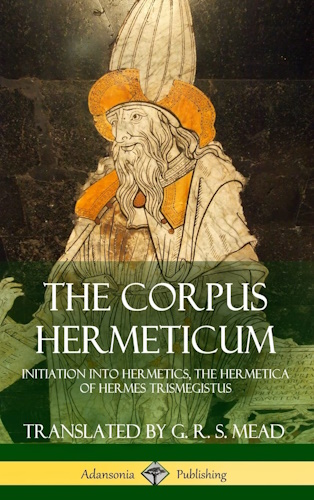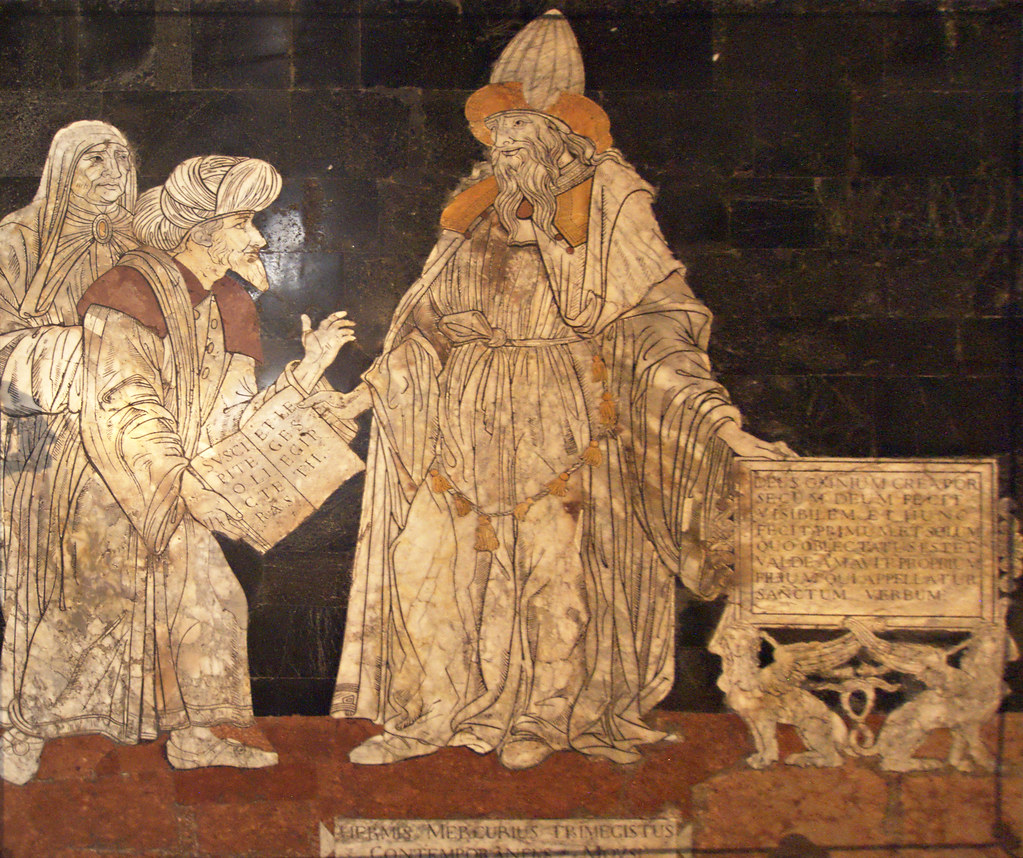
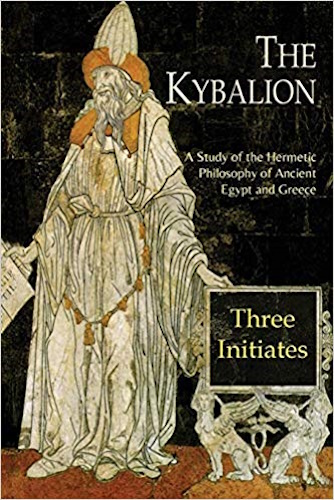

![Thrice-Greatest Hermes; Studies in Hellenistic Theosophy and Gnosis [Three Volumes in One] Thrice-Greatest Hermes; Studies in Hellenistic Theosophy and Gnosis [Three Volumes in One]](http://realityroars.com/images/affiliate-creative/thrice-greatest-hermes--studies-in-hellenistic-theosophy-and-gnosis.jpg)

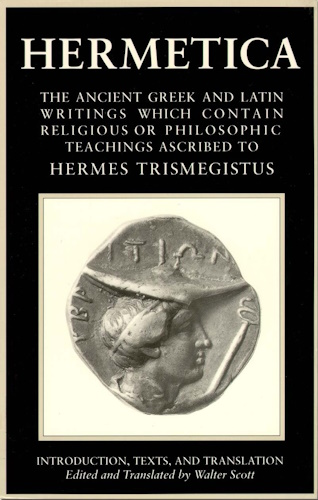



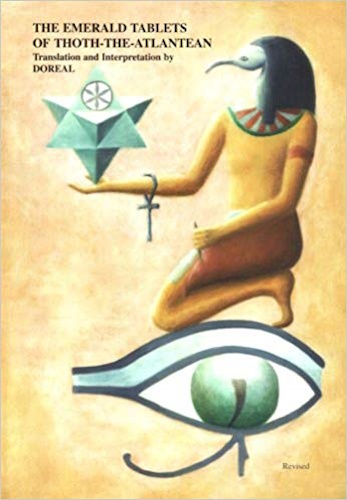

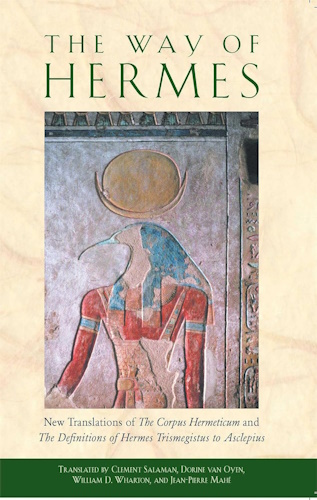

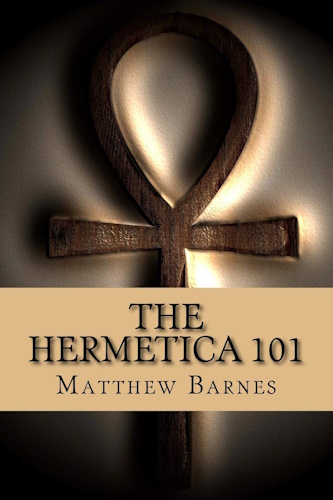

![]()
![]()
IX. On Thought and Sense
<This somewhat diffuse essay covers a series of topics, starting with (and to some extent from) the concept that the set of perceptions we call "thoughts" and the set we call "sensory perceptions" are not significantly different from each other. The implications of this idea play a significant role in later Hermetic thought, particularly in the areas of magic and the Art of Memory; in this tractate, though, the issues involved are barely touched, and the argument wanders into moral dualisms and the equally important, but distinct, idea that the Cosmos is itself a divine creative power.
<Section 10, in which understanding is held up as the source and precondition of belief, should probably be seen as part of the same ancient debate on the roles of faith and reason that gave rise to Tertullian's famous credo quia absurdum ("I believe because it is absurd"). - JMG>
1. I gave the Perfect Sermon (Logos) yesterday, Asclepius; today I think it right, as sequel thereunto, to go through point by point the Sermon about Sense.
Now sense and thought do seem to differ, in that the former has to do with matter, the latter has to do with substance. But unto me both seem to be at-one and not to differ - in men I mean. In other lives <or living creatures> sense is at-oned with Nature, but in men thought.
Now mind doth differ just as much from thought as God doth from divinity. For that divinity by God doth come to be, and by mind thought, the sister of the word (logos) and instruments of one another. For neither doth the word (logos) find utterance without thought, nor is thought manifested without word.
2. So sense and thought both flow together into man, as though they were entwined with one another. For neither without sensing can one think, nor without thinking sense.
But it is possible [they say] to think a thing apart from sense, as those who fancy sights in dreams. But unto me it seems that both of these activities occur in dream-sight, and sense doth pass out of the sleeping to the waking state.
For man is separated into soul and body, and only when the two sides of his sense agree together, does utterance of its thought conceived by mind take place.
3. For it is mind that doth conceive all thoughts - good thoughts when it receives the seeds from God, their contraries when [it receiveth them] from the daimonials; no part of Cosmos being free of daimon, who stealthily doth creep into the daimon who's illumined by God's light <i.e., the human soul>, and sow in him the seed of its own energy.
And mind conceives the seed thus sown, adultery, murder, parricide, [and] sacrilege, impiety, [and] strangling, casting down precipices, and all such other deeds as are the work of evil daimons.
4. The seeds of God, 'tis true, are few, but vast and fair, and good - virtue and self-control, devotion. Devotion is God-gnosis; and he who knoweth God, being filled with all good things, thinks godly thoughts and not thoughts like the many [think].
For this cause they who Gnostic are, please not the many, nor the many them. They are thought mad and laughted at; they're hated and despised, and sometimes even put to death.
For we did say that bad must needs dwell on earth, where 'tis in its own place. Its place is earth, and not Cosmos, as some will sometimes say with impious tongue.
But he who is a devotee of God, will bear with all - once he has sensed the Gnosis. For such an one all things, e'en though they be for others bad, are for him good; deliberately he doth refer them all unto the Gnosis. And, thing most marvelous, 'tis he alone who maketh bad things good.
5. But I return once more to the Discourse (Logos) on Sense. That sense doth share with thought in man, doth constitute him man. But 'tis not [every] man, as I have said, who benefits by thought; for this man is material, that other one substantial.
For the material man, as I have said, [consorting] with the bad, doth have his seed of thought from daimons; while the substantial men [consorting] with the Good, are saved by God.
Now God is Maker of all things, and in His making, He maketh all [at last] like to Himself; but they, while they're becoming good by exercise of their activity, are unproductive things.
It is the working of the Cosmic Course that maketh their becomings what they are, befouling some of them with bad and others of them making clean with good.
For Cosmos, too, Asclepius, possesseth sense-and-thought peculiar to itself, not like that of man; 'tis not so manifold, but as it were a better and a simpler one.
6. The single sense-and-thought of Cosmos is to make all things, and make them back into itself again, as Organ of the Will of God, so organized that it, receiving all the seeds into itself from God, and keeping them within itself, may make all manifest, and [then] dissolving them, make them all new again; and thus, like a Good Gardener of Life, things that have been dissolved, it taketh to itself, and giveth them renewal once again.
There is no thing to which it gives not life; but taking all unto itself it makes them live, and is at the same time the Place of Life and its Creator.
7. Now bodies matter [-made] are in diversity. Some are of earth, of water some, some are of air, and some of fire.
But they are all composed; some are more [composite], and some are simpler. The heavier ones are more [composed], the lighter less so.
It is the speed of Cosmos' Course that works the manifoldness of the kinds of births. For being a most swift Breath, it doth bestow their qualities on bodies together with the One Pleroma - that of Life.
8. God, then, is Sire of Cosmos; Cosmos, of all in Cosmos. And Cosmos is God's Son; but things in Cosmos are by Cosmos.
And properly hath it been called Cosmos [Order]; for that it orders all with their diversity of birth, with its not leaving aught without its life, with the unweariedness of its activity, the speed of its necessity, the composition of its elements, and order of its creatures.
The same, then, of necessity and propriety should have the name of Order.
The sense-and-thought, then, of all lives doth come into them from without, inbreathed by what contains [them all]; whereas Cosmos receives them once for all together with its coming into being, and keeps them as a gift from God.
9. But God is not, as some suppose, beyond the reach of sense-and-thought. It is through superstition men thus impiously speak.
For all the things that are, Asclepius, all are in God, are brought by God to be, and do depend on Him - both things that act through bodies, and things that through soul-substance make [other things] to move, and things that make things live by means of spirit, and things that take unto themselves the things that are worn out.
And rightly so; nay, I would rather say, He doth not have these things; but I speak forth the truth, He is them all Himself. He doth not get them from without, but gives them out [from Him].
This is God's sense-and-thought, ever to move all things. And never time shall be when e'en a whit of things that are shall cease; and when I say "a whit of things that are", I mean a whit of God. For thigs that are, God hath; nor aught [is there] without Him, nor [is] He without aught.
10. These things should seem to thee, Asclepius, if thou dost understand them, true; but if thou dost not understand, things not to be believed.
To understand is to believe, to not believe is not to understand.
My word (logos) doth go before [thee] to the truth. But mighty is the mind, and when it hath been led by word up to a certain point, it hath the power to come before [thee] to the truth.
And having thought o'er all these things, and found them consonant with those which have already been translated by the reason, it hath [e'en now] believed, and found its rest in that Fair Faith.
To those, then, who by God['s good aid] do understand the things that have been said [by us] above, they're credible; but unto those who understand them not, incredible.
Let so much, then, suffice on thought-and-sense.


![Thrice-Greatest Hermes; Studies in Hellenistic Theosophy and Gnosis [Three Volumes in One] Thrice-Greatest Hermes; Studies in Hellenistic Theosophy and Gnosis [Three Volumes in One]](http://realityroars.com/images/affiliate-creative/thrice-greatest-hermes--studies-in-hellenistic-theosophy-and-gnosis.jpg)











-
Urantia Book, 44:0.11 - The Celestial Artisans
Never in your long ascendancy will you lose the power to recognize your associates of former existences. Always, as you ascend inward in the scale of life, will you retain the ability to recognize and fraternize with the fellow beings of your previous and lower levels of experience. Each new translation or resurrection will add one more group of spirit beings to your vision range without in the least depriving you of the ability to recognize your friends and fellows of former estates.
-
Princess Bride 1987 Wallace Shawn (Vizzini) and Mandy Patinkin (Inigo Montoya)
Vizzini: HE DIDN'T FALL? INCONCEIVABLE.
Inigo Montoya: You keep using that word. I do not think it means what you think it means. -
Urantia Book, 117:4.14 - The Finite God
And here is mystery: The more closely man approaches God through love, the greater the reality -- actuality -- of that man. The more man withdraws from God, the more nearly he approaches nonreality -- cessation of existence. When man consecrates his will to the doing of the Father's will, when man gives God all that he has, then does God make that man more than he is.
-
Urantia Book, 167:7.4 - The Talk About Angels
"And do you not remember that I said to you once before that, if you had your spiritual eyes anointed, you would then see the heavens opened and behold the angels of God ascending and descending? It is by the ministry of the angels that one world may be kept in touch with other worlds, for have I not repeatedly told you that I have other sheep not of this fold?"
-
Urantia Book, Foreword - 0:12.12 - The Trinities
But we know that there dwells within the human mind a fragment of God, and that there sojourns with the human soul the Spirit of Truth; and we further know that these spirit forces conspire to enable material man to grasp the reality of spiritual values and to comprehend the philosophy of universe meanings. But even more certainly we know that these spirits of the Divine Presence are able to assist man in the spiritual appropriation of all truth contributory to the enhancement of the ever-progressing reality of personal religious experience—God-consciousness.
-
Urantia Book, 1:4.3 - The Mystery Of God
When you are through down here, when your course has been run in temporary form on earth, when your trial trip in the flesh is finished, when the dust that composes the mortal tabernacle "returns to the earth whence it came"; then, it is revealed, the indwelling "Spirit shall return to God who gave it." There sojourns within each moral being of this planet a fragment of God, a part and parcel of divinity. It is not yet yours by right of possession, but it is designedly intended to be one with you if you survive the mortal existence.
-
Urantia Book, 1:4.1 - The Mystery Of God
And the greatest of all the unfathomable mysteries of God is the phenomenon of the divine indwelling of mortal minds. The manner in which the Universal Father sojourns with the creatures of time is the most profound of all universe mysteries; the divine presence in the mind of man is the mystery of mysteries.
-
Urantia Book, 1:4.6 - The Mystery Of God
To every spirit being and to every mortal creature in every sphere and on every world of the universe of universes, the Universal Father reveals all of his gracious and divine self that can be discerned or comprehended by such spirit beings and by such mortal creatures. God is no respecter of persons, either spiritual or material. The divine presence which any child of the universe enjoys at any given moment is limited only by the capacity of such a creature to receive and to discern the spirit actualities of the supermaterial world.
-
Urantia Book, 11:0.1 - The Eternal Isle Of Paradise
Paradise is the eternal center of the universe of universes and the abiding place of the Universal Father, the Eternal Son, the Infinite Spirit, and their divine co-ordinates and associates. This central Isle is the most gigantic organized body of cosmic reality in all the master universe. Paradise is a material sphere as well as a spiritual abode. All of the intelligent creation of the Universal Father is domiciled on material abodes; hence must the absolute controlling center also be material, literal. And again it should be reiterated that spirit things and spiritual beings are real.
-
Urantia Book, 50:6.4 - Planetary Culture
Culture presupposes quality of mind; culture cannot be enhanced unless mind is elevated. Superior intellect will seek a noble culture and find some way to attain such a goal. Inferior minds will spurn the highest culture even when presented to them ready-made.
-
Urantia Book, 54:1.6 - True And False Liberty
True liberty is the associate of genuine self-respect; false liberty is the consort of self-admiration. True liberty is the fruit of self-control; false liberty, the assumption of self-assertion. Self-control leads to altruistic service; self-admiration tends towards the exploitation of others for the selfish aggrandizement of such a mistaken individual as is willing to sacrifice righteous attainment for the sake of possessing unjust power over his fellow beings.
-
Urantia Book, 54:1.9 - True And False Liberty
How dare the self-willed creature encroach upon the rights of his fellows in the name of personal liberty when the Supreme Rulers of the universe stand back in merciful respect for these prerogatives of will and potentials of personality! No being, in the exercise of his supposed personal liberty, has a right to deprive any other being of those privileges of existence conferred by the Creators and duly respected by all their loyal associates, subordinates, and subjects.
-
Urantia Book, 54:1.8 - True And False Liberty
There is no error greater than that species of self-deception which leads intelligent beings to crave the exercise of power over other beings for the purpose of depriving these persons of their natural liberties. The golden rule of human fairness cries out against all such fraud, unfairness, selfishness, and unrighteousness.

